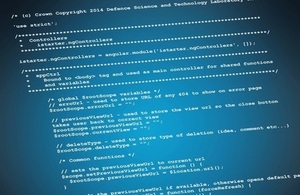First major contribution from external party for Baleen software
Dstl is working with industry to improve its open source software.

Following the release of the software in September last year, the Defence Science and Technology Laboratory (Dstl) has received interest from several industrial collaborators and a steady increase in the number of people using Baleen for their own projects and work.
Dstl is pleased to announce today that it has had its first external contributions to the code base, from Roke. As part of a Home Office, Communications Capabilities Delivery (CCD) programme project, Roke is supporting delivery of a suite of new tools to Law Enforcement. Re-use of Baleen has enabled delivery of an innovative and cost effective tool which enables users to extract more value from unstructured data in less time.
Dstl’s James Baker says:
One of the hopes of releasing Baleen as an open source project was that other developers would build on what Dstl had developed, and it is rewarding to see that this has now happened. Contributions to the code base are welcomed, and we’re really keen for an active community to build up around the software.
Roke Software Lead, Nick Brunwin says:
The access Dstl has given to Baleen is a great opportunity for Roke. It provides us with a well-engineered framework for big data analytics – a catalyst for more efficient defence operations. We have the chance to combine existing components, inputs from other partners and our own algorithms to create highly capable systems. It’s a great example of industry collaboration which will directly benefit the UK.
In addition to the contribution from Roke, a number of other companies have been using and developing Baleen. These include Tenode, which has developed and open sourced a number of additional components on its GitHub repository and also has plans to contribute code back to the main code base. One of the new features Tenode has been developing is a ‘Job’ system that will allow Baleen to integrate with external scripts and processes, enabling even more powerful corpus level text analytics.
Dstl’s code can be found on the GitHub site. For further information on the technical side, email: oss@dstl.gov.uk.
Dstl media enquiries
Email DstlPress@dstl.gov.uk
Press office 01980 950000 option 2